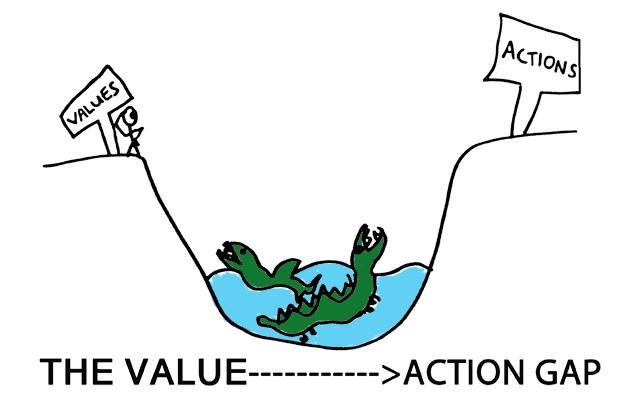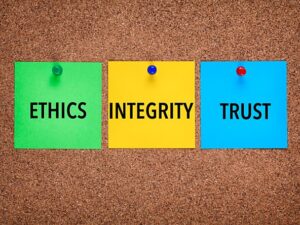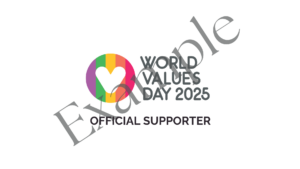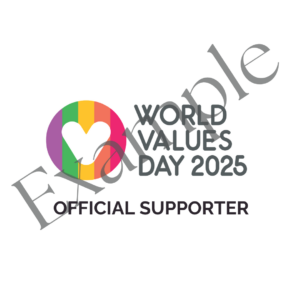As World Values Day approaches I am considering my own personal journey to spending more time considering and living by my values. I first began thinking deeply about values when I was tasked with writing a research essay during my masters course; Fashion & The Environment.
Disposable Fashion – Disposable Values
The fashion and clothing market has changed dramatically over the last 20 years, and is now the second largest polluting industry globally. Currently three quarters of UK consumers admit to throwing away clothes, rather than recycling or donating them. This results in 235m items of unwanted clothing ending up in UK landfill per year.
For something to be thrown away so easily, it is often because we deem it to have little or no value. With disposable fast fashion clothing, we have been conditioned to perceive the value in the low cost price, with little consideration to the person who made the garment, the impact of its production on the environment, the quality, longevity and emotional durability in our wardrobes and what happens with it once we have tired of it. Our society has changed from values of make-do-and-mend to that of instant gratification and disposability.
With the realisation that without a strong foundation of value based thinking and behaviour, this value-less, throw-away consumption is likely to continue, I began to consider how it is we form our values and how in turn these chosen values affect our identity and actions.
In a bid to look at ways that we can make sustainability issues more engaging and relevant to people’s lives, I began to design and test a series of workshops exploring emotional sustainability.
Challenging Our Value Systems
On realising that until we increase the discourse on values, we will struggle to increase the discourse on sustainability, I naturally started with a workshop helping people to explore their personal and shared values. Acknowledging that values are not something that is frequently considered amongst many people, I chose to begin with a simpler question: what is it that you need to survive, and what do you need to thrive?
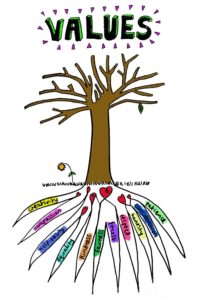 This became a powerful pair of questions and ones that I have returned to again and again. Not only does it help participants consider whether their basic needs are being met, and what they can do to empower themselves to reach their potential. It also highlights our differences and similarities, and the reasons for these.
This became a powerful pair of questions and ones that I have returned to again and again. Not only does it help participants consider whether their basic needs are being met, and what they can do to empower themselves to reach their potential. It also highlights our differences and similarities, and the reasons for these.
And finally it often shows that we take for granted the basic gifts of the earth and mother nature: water, sunlight, air, earth-things that are increasingly compromised by pollution and climate change. From the conversations that arise in dialogue from this exercise, it becomes a natural progression to speak about values and begin to understand what is important to us and why.
Closing The Value-Action Gap
As part of my research I also conducted a small questionnaire on sustainability and behaviour change. On asking those surveyed, what bought most meaning to their life, the overwhelming majority of answers were: spending time with family and friends or doing something creative and spending time in nature. Answers not linked to material value but the the value of time spent doing things we love, with fellow human beings and our environment.
It is true that there is often a value-action gap in what we say is important to us and how we act. In the same survey I asked people what they thought were the biggest barriers to sustainable living, the majority answered: time, convenience and cost.
So what happens between the restraints of time and cost, and that which brings meaning to our lives? When it comes to living more sustainable choices, there are some small changes that are simple; like carrying a reusable shopping bag and reusable water bottle to reduce our plastic consumption. But how many of us have given up our smart phones due to knowledge that the raw earth minerals inside could have be mined by children? Where does our responsibility as consumers end and the designers and manufacturers responsibility begin? And what about our joint responsibility as global citizens on a shared planet? If we consider these questions using our personal and shared values as a starting place, we can move from a position of guilt for not doing enough and feeling powerless, to one of empowerment through the knowledge that we know how we want to live our lives and what kind of world we want to live in together.
About The Author
Jessica Ball uses Bohm dialogue and creative writing and other mediums in workshops to help people explore culture and values, gender equality and sustainability. She also teaches the principles and practice of Bohm dialogue for groups and organisations to improve communication and participation, build trust, and increase awareness and understanding.
Further Resources
- See the previous blog in the series – Valueism: A Role For Values, by Nigel Cohen
- Like this blog? See another by Jessica Ball – The Value(s) of Dialogue
- See the full list of blogs at www.worldvaluesday.com/blogs
- Participate in the Values Challenge this year! Follow these links for organisations, for community groups, for schools, or for individuals.
- For more inspiration, follow us on social media: LinkedIn | Twitter | Facebook | Instagram

